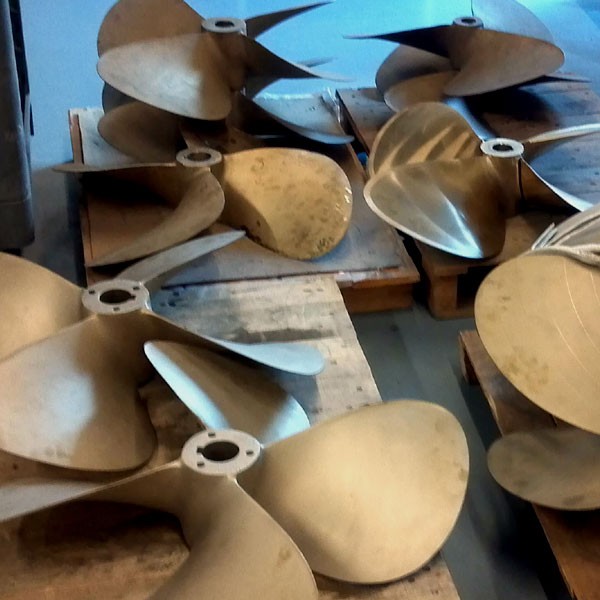Common Propeller Diagnostics
Common Propeller Problems:
-
Impact Damage
-
Propeller Induced Vibration
-
Overloaded Engine (often evident as smoke in the exhaust)
-
Over Turning Engine
-
Propeller Cavitation
-
Singing Propeller
-
Poor Fuel Economy
-
Engines Not Synchronized
- Reversing Problems
Impact Damage:
This is the most obvious. You’ve hit something and your performance has suddenly deteriorated. Depending on the severity of the damage, repairs can usually be made.
Propeller Induced Vibration:
Now this is something you don't see but can certainly feel. Propeller induced vibration can be caused by a variety of things; inaccuracies in pitch, camber, blade shape, spacing , tracking , rake, cup height , and weight distribution. A Prop Scan of your propeller will reveal if any of these things are the cause. Of course, once identified, they can be corrected resulting in a smoother, more efficient, and often faster propeller.
Overloaded Engine:
If you are the proud owner of a beautiful diesel yacht but you’re a little embarrassed about the black smoke emerging from its transom, you needn’t be any longer. This is usually a sure sign of overloading your engine and we have the solutions. The best solution may be to reduce the pitch of the propeller. A comparison of your wide open throttle (WOT) RPMs vs. what’s recommended for the engine will tell us exactly how much. After a pitch change, your now correctly loaded engine will last longer and use less fuel.
Over Turning Engine:
When your engine revs higher than its recommended WOT rpm, you’re not capturing all the available horsepower. A correction in pitch will help you improve speed and efficiency.
Propeller Cavitation:
Cavitation is caused by water vaporizing due to pressure reduction on the propeller blades. This can be caused by mechanical damage such as a bent or impacted blade, wrongly matched power to propeller type, or incorrect propeller design. This distortion of the water flow pattern over the propeller can significantly reduce power and efficiency and cause erosion of the rotating propeller blades. Modifications can be made to reduce the level of cavitation which results in improved efficiency and extended propeller life.
Singing Propeller:
Some propellers produce a high pitched noise at certain points between idle speed and full rpms. If this point lays spot in the middle of your cruising rpm it will be intolerable. Prop Scan technicians have the solution.
Poor Fuel Economy:
Does your boat consume more fuel than you believe it should? This often happens with low classed (inaccurate) propellers. On average, an ISO Class 1 propeller uses between 5-10% less fuel than a Class III propeller.
Engines Not Synchronized:
Many twin screw vessels have a hard time synchronizing their engines. This is because the port and starboard engines are not loaded equally. This is usually caused by pitch, camber, or section shape differences between the two propellers. We can analyze your situation to get both engines working well together.
Reversing Problems:
Section shape on the suction side of the propeller can influence the ability to get strong reverse thrust. Cup height can also affect reversing. Prop Scan technicians can sort this out and provide a solution.
North Coast Tech was Established in 2003
Member of the National Marine Propeller Association
Certified Inboard Propeller Technician
Certified by Propeller Dynamics
Repair, correct, and tune propellers better than or equal to ISO standards
Sell new and used propellers
Sell and repair all inboard underwater gear, i.e. struts, rudders shafts bearings, etc.
Dealer for PYI Dripless Shaft Sealing System
Questions on your prop? Call us at 419 433 9550


